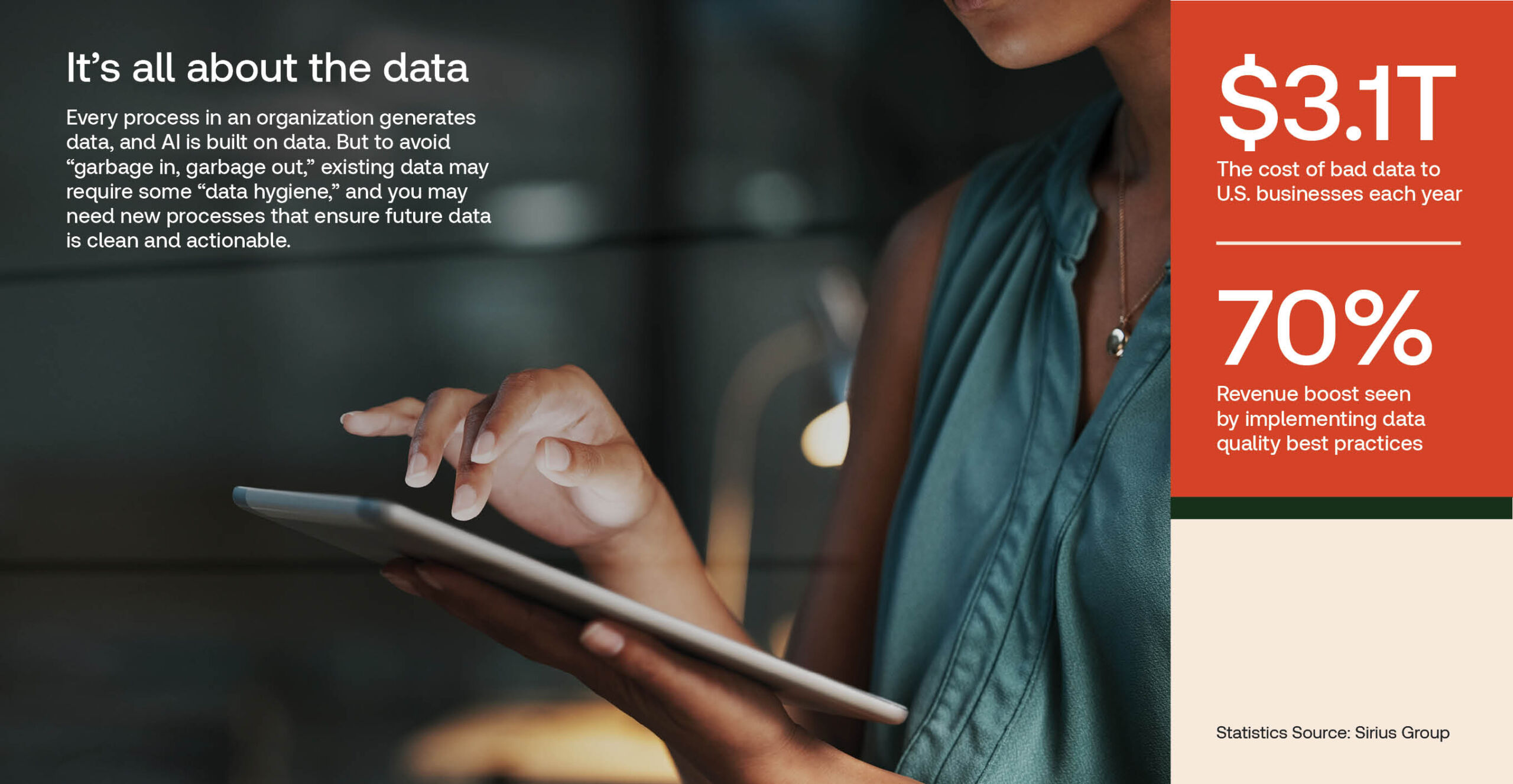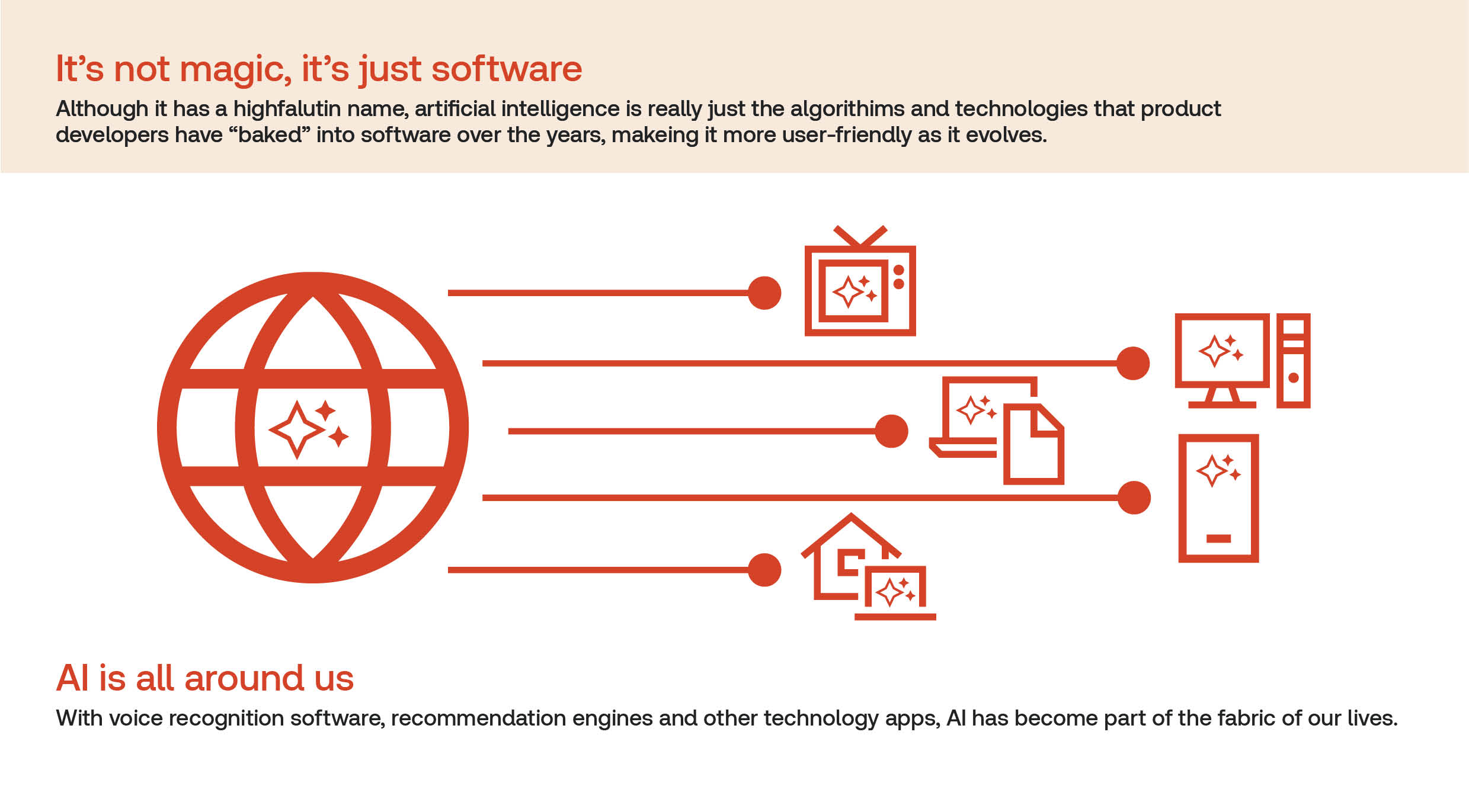The rapid advancement of artificial intelligence (AI) has revolutionized various industries, and the tax and accounting profession is no exception.
Jump to ↓
| Automation of routine tasks |
| Enhanced data analysis |
| Improved compliance and risk management |
| Streamlined processes |
| Enhanced client services |
| Embrace the transformative power of AI in the tax and accounting profession |
In 2023, AI has become an integral part of tax and accounting professionals’ processes by streamlining operations, enhancing accuracy, and enabling professionals to focus on higher-value tasks.
Automation of routine tasks
One of the most significant ways AI has revolutionized the tax and accounting profession is through the automation of routine tasks. Traditionally, tax professionals spend a considerable amount of time on repetitive and time-consuming activities such as data entry, invoice processing, and reconciliations. However, with the advent of AI-powered software, these tasks can now be automated, freeing up valuable time for professionals to focus on higher-value activities.
AI-powered software can handle large volumes of data with speed and accuracy, significantly reducing the risk of human error. By automating these mundane tasks, tax professionals can allocate more time to strategic planning, analysis, and providing valuable insights to their clients. This not only enhances the efficiency of tax and accounting processes but also improves the overall quality of financial reporting.
Enhanced data analysis
AI has brought about a paradigm shift in data analysis within the tax and accounting profession. With its ability to process vast amounts of data rapidly, AI algorithms can identify patterns, anomalies, and trends that might have otherwise gone unnoticed. This enables tax professionals to make more informed decisions and offer valuable insights to their clients.
AI-powered analytic tools can analyze financial data from multiple sources, including bank statements, invoices, and expense reports. By leveraging machine learning algorithms, these tools can identify potential areas of improvement, detect irregularities, and provide recommendations for optimizing financial performance. This level of data analysis goes beyond what human capabilities alone can achieve, allowing tax professionals to provide more accurate and proactive advice to their clients.
Also, AI-powered analytics can predict future financial trends, helping firms plan and strategize effectively. By analyzing historical data and market trends, AI algorithms can provide valuable insights into potential risks and opportunities. This empowers tax professionals to guide their clients in making informed decisions and developing robust financial strategies.

Improved compliance and risk management
Ensuring compliance with ever-evolving regulations is a critical responsibility for tax and accounting professionals. Failure to comply with tax laws and regulations can result in severe penalties and legal consequences. AI has significantly improved compliance and risk management by automating the monitoring and analysis of regulatory changes.
AI algorithms can quickly scan through extensive legal documents, such as tax codes and regulations, identify relevant updates, and provide real-time notifications to professionals. This ensures that businesses stay compliant with the latest regulations, reducing the risk of penalties or legal issues. By automating the compliance monitoring process, tax professionals can focus on interpreting and implementing the changes, rather than spending excessive time on manual research.
AI-powered compliance tools can assist in identifying potential risks and anomalies in financial data. These tools analyze patterns and detect irregularities, flagging any suspicious transactions or activities that may indicate fraudulent behavior. This enables tax professionals to proactively address potential risks and mitigate them effectively, safeguarding their clients’ financial interests.
Streamlined processes
AI has transformed the audit process within the tax and accounting profession. Traditionally, audits involved manually reviewing financial data, which was time-consuming and prone to human error. However, with the advent of AI-powered audit software, the process has become more efficient and accurate.
AI algorithms can analyze vast amounts of financial data, identify potential risks, and flag suspicious transactions. By leveraging machine learning, these algorithms continuously learn from past audits, improving their ability to detect anomalies and potential fraud. This streamlines the audit process, allowing tax professionals to conduct more thorough and effective assessments.
AI-powered audit software can provide real-time insights into financial performance, highlighting areas that require attention or improvement. This enables tax professionals to provide valuable recommendations to their clients, helping them enhance their financial controls and mitigate risks. By leveraging AI for audits, tax professionals can instill greater confidence in the accuracy of financial statements and provide assurance to stakeholders.

Enhanced client services
AI has significantly enhanced client services within the tax and accounting profession. AI-powered chatbots and virtual assistants have revolutionized the way professionals interact with their clients. These virtual assistants can provide instant responses to client queries, reducing response times and elevating customer satisfaction.
AI-powered chatbots can handle a wide range of client inquiries, from basic tax-related questions to more complex financial planning queries. By leveraging natural language processing and machine learning, these chatbots can understand client needs and provide accurate and personalized responses. This not only improves the overall client experience but also frees up professionals’ time to focus on more complex and strategic client engagements.
Additionally, AI-powered software can generate customized reports and financial statements tailored to the specific needs of each client. By analyzing client data and financial information, these tools can provide personalized insights and
Embrace the transformative power of AI in the tax and accounting profession
In 2023, AI has transformed the tax and accounting profession, revolutionizing processes, enhancing accuracy, and enabling professionals to provide better services to their clients. Automation of routine tasks, enhanced data analysis, improved compliance and risk management, streamlined audit processes, and enhanced client services are just a few of the ways AI has made a significant impact. As AI continues to evolve, the tax and accounting profession will undoubtedly witness further advancements, empowering professionals to deliver even greater value to their clients.










